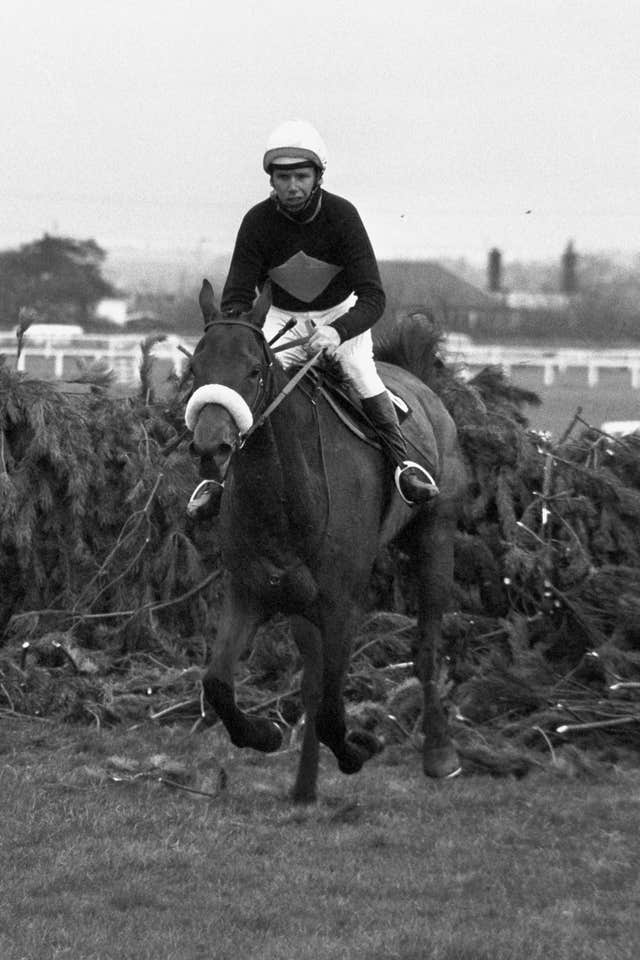National heartbreak endures for Crisp’s rider Pitman
Incredibly it is 50 years since perhaps the most famous Grand National of them all, when Crisp was agonisingly reeled in by Red Rum in the dying strides in 1973.
Perhaps because it was the first Grand National shown in colour on television, perhaps because no horse had ever attacked the four and a half miles and 30 fences quite like Crisp or perhaps because it was the start of Red Rum’s Aintree odyssey, that day on March 31, 1973 is etched into racing folklore.
There is an argument for even saying the race was such a thrilling spectacle it helped secure its long-term future. Aintree racecourse had been under threat with a housing company buying the land but unable to get planning permission before the Jockey Club bought it off them – with help from the public.
Crisp was out on his own in his native Australia and having won all there was to win there, his adventurous owner Sir Chester Manifold took the brave decision to send him to England to see what he was really made of.
🐴 Let's join them on the second circuit of the 1973 Grand National.
Front-running Crisp, carrying 12st and ridden by Richard Pitman, is having a ball. Red Rum (10st 5lb) is giving pursuit under Brian Fletcher. #GrandNational @AintreeRaces pic.twitter.com/1j5MGh4c1N
— Racing TV (@RacingTV) April 4, 2022
In the care of Fred Winter, he carried all before him, going on to win the 1971 Champion Chase over two miles with ease and the following season he was aimed at the Gold Cup but, held up to preserve his stamina, he sulked and finished fifth.
Despite this, Winter targeted the 1973 Grand National. In those days it did not seem as far-fetched as it would if Energumene were lining up this season, with the theory two-milers ran well in it due to the pace of the race.
Crisp was to be ridden by Richard Pitman, who went on to have a highly successful career in broadcasting.
Sent off a 9-1 joint-favourite with Red Rum, Crisp was conceding a whopping 23lb to Ginger McCain’s runner – a task that now looked nigh on impossible given what Red Rum went on to achieve.
That he came so close to doing so is perhaps why Crisp has gone down in folklore.
The unforgettable Crisp with Richard Pitman the morning of the 1973 Grand National pic.twitter.com/w7kOWF4itP
— mandy pitman (@mandy_pitman) December 23, 2022
“In those days it seemed that every Grand National was going to be the last. The Topham family had sold Aintree to a building company but it was the popularity of Red Rum, in the end, which made the fundraising by the Jockey Club that much easier,” said Pitman, now 80.
“All the purists, and they’d be right, would say a two-mile Champion Chase winner with 12st over four and a half miles should be dropped out to conserve energy. That would be correct theoretically, but me and Fred spoke about it and with 40 in front of you, some not great jumpers, and him being so enthusiastic over fences, he’d be bound jump into one.
“The plan was to jump off down the inside, where the brave men go. Fred was a big fan of that because after Becher’s it starts to turn, you save so much ground if you are on the inner and then you can’t get pushed wide.
“I wanted to slow the race down from the front, which you can do as a senior jockey, but in practice that theory didn’t work as Crisp was so enthusiastic. I’ve faced a lot of criticism for this ride for the last 50 years, and I take most of it, but those who say I shouldn’t have made the running I find hard to take as it was our plan.
“People also thought he was running away with me, but he never was. When he saw a fence he quickened of his own volition, so with every fence he gained ground.”
Grey Sombrero had narrowly led for the first mile but when he fell at The Chair, Crisp was left with a yawning lead that only grew bigger.
“From that moment on I couldn’t hear the others,” said Pitman. “It was another circuit before I heard anything.
“That experience, totally isolated, was strange because of the lack of sound. Every National I’d ridden in, with 40 runners, the sounds were all around you – horses exhaling, hitting fences, jockeys shouting, the sound of hooves – there was just nothing.
“Looking down that line of six fences to Becher’s is a marvellous sight and to do it on a horse who loved every minute of it, it was such a joy and a pleasure. You’d always see amusing sights on the inside, for instance there was one jockey just holding a bridle – no horse!
“It was unique on that second circuit, in silence, but then I heard Michael O’Hehir, the commentator on the PA system say ‘and Crisp is 25 lengths clear, Red Rum is coming out of the pack but Fletcher is kicking him’ and I just thought ‘that’ll do me’ so I just sat and held him.
“I then saw David Nicholson on the inside track, his horse (Highland Seal) was picking grass while he sat there with his arms folded! The Duke, as we called him as he was rather grand, said ‘Richard, you’re actually 33 lengths clear, kick on and you will win’ but that was exactly what I wasn’t going to do because I needed to save every ounce.”

Over the second-last and the gap was still 10 lengths or more, but on the run to the last Crisp’s stride notably began to shorten and Brian Fletcher sensed his chance.
Then came the crucial moment to which Pitman has always admitted. With the elbow fast approaching, Pitman picked up his whip in his right hand to offer encouragement, but Crisp was so tired he veered to the left, losing all momentum.
“He literally went from feeling strong in my hands on jumping the second-last, to a few strides later I could tell he was coming to the end of his tether. Jumping the last I could hear Red Rum for the first time,” said Pitman.
“It was fast ground that day you could could hear the horses hooves, ‘drmmm drmmm, drmmm drmmm’ but Red Rum had flappy nostrils, so when he exhaled there would be a ‘pwwwrrr, pwwwrrr’ and I can still hear those sounds chasing me now ‘drmmm drmmm, pwwwrrr pwwwrr’.
“We were running in treacle, we were going forwards, but it was hard work and then I made the mistake that I’ve been paying for for 50 years, which was I thought I needed to wake him up so I picked my whip up with my right hand and he immediately fell away to the left, when I needed him to go right at the elbow.
“It was a stupid, boyish error. I should have kept two hands on the reins, got him to the elbow and then used the whip if I needed to.”
On reaching the elbow, Crisp was on an even keel once more but Red Rum had built up a head of steam and with a furlong to run, the result looked inevitable.
“I lost all momentum. I reckon it cost me two lengths and we lost by three-quarters. That run-in is 494 yards and I remember every one of them. Brian Fletcher was very clever because he didn’t make his challenge close to me, just in case Crisp had anything left to fight back,” said Pitman.
“The desolation changed to euphoria within a minute, I promise you. I was exhilarated with the ride I’d had, it was the most exciting thing I’d ever done.
“Fred never criticised me, in public or private. It wasn’t until a few weeks later we were on our way home from Plumpton, I used to drive him while he used to sleep, but this day he opened one eye and said ‘You know why you got beat, don’t you?’ I said ‘Yep’. He said ‘Well, there’s no point discussing it then’. He was a great man.”
Crisp only ran once more, at level weights against Red Rum at Doncaster. Crisp won easily but picked up an injury in doing so and was retired, but he did enjoy a few years hunting afterwards.
Following his death in a hunting accident, he was buried at his then-owner’s estate where they planted a cherry tree over him which blossoms around Grand National time every year.









